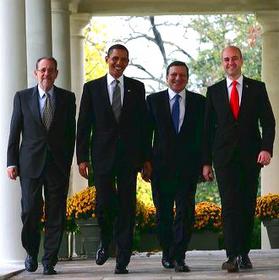

Foreign minister
The Lisbon Treaty has established an EU foreign “minister” to conduct the EU's Common Foreign and Security Policy. The foreign minister is also a vice president in the EU Commission.
The foreign minister post was allocated to the Italian foreign minister Federica Mogherini at a European summit 30 August 2014. The appointment was decided by 28 prime ministers and presidents in agreement with the Commission President Jean-Claude Juncker.
The European Parliament will later approve the full Commission - including the foreign minister. with absolute majority of its members, it is 376 of 751 possible votes.
The Council must approve the full Commission with qualified majority - it is 260 of 352 votes. From 1 November 2014 a new super qualified majority will be used for such appointments and to take decisions where the proposal does not originate from the Commission.
The super quailified majority consists of 72% of countries which also represents at least 65% of the total EU-population. Qualified majority was until then 74% of member states.
Javier Solana was appointed to this position but left when the post was introduced with the implementation of the Lisbon Treaty in 2009.
The British long life peer, Catherine Ashton, former head of the House of Lords in the United Kingdom was appointed to the job in a special summit in Brussels, 19 December 2009 and leave in 2014. She has also been a Vice President in the Commission.
In 2014 the post was taken over by the Italian foreign minister Federica Mogherini.
The Lisbon Treaty deleted the word "Foreign Minister" from the rejected EU Constitution and uses instead the title "High Representative of the Union for Foreign Affairs and Security Policy". Media most often use the term Foreign Chief or Minister.
See also High Representative and Art. 18 TEU in the Lisbon Treaty